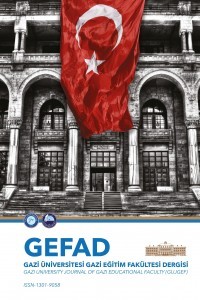MATEMATİK EĞİTİMİ PROGRAMLARINA ÇOK BOYUTLU BİR YAKLAŞIM: "LIE CEBİRİ" ÖRNEĞİ
Anahtar Kelimeler:
Matematik Eğitimi, Lie Cebirleri, Alan Bilgisi.
A MULTI-DIMENSIONAL APPROACH IN MATHEMATICS TEACHER EDUCATION PROGRAMS: "COMPUTATIONS IN FREE AND FINITELY GENERATED LIE ALGEBRAS" EXAMPLE
Let be a finitely generated Lie algebra and be an arbitrary subalgebra of . The maximal linearly independent set of the algebra modulo the subalgebra is called the modulo basis of . In this article we apply computer techniques to compute the modulo basis of using an algorithm given by Aydın in her PhD thesis.
Keywords:
Mathematics Education, Lie Algebras, Content Knowledge.,
___
- Andary, P. (1997). Finely homogeneous computations in free Lie algebras. Discrete Math. Theor. Comput. Sci, 1(1), 101–114.
- Aydın, E. (1997). Subalgbras of Lie Algebras of Finite Codimension, PhD Thesis, Çukurova University.
- Berry, J. (1997). Improving discrete mathematics and algorithms curricula with LINK. ITICSE’ 97 2nd Conference on Integrating Technology into Computer Science Education, 14-20. ACM: New York.
- Bourbaki N. (1975). Lie groups and lie algebras, Part II., Addison-Wesley.
- Cohen, A. M., & de Graaf, W. A. (1996). Lie algebraic computation. Comput. Phys. Comm. 97(1-2), 53–62.
- Gerdt, V. P., & Kornyak, V. V. (1996). Construction of finitely presented Lie algebras and superalgebras. J. Symbolic Comput, 21(3), 337–349. de Graaf, W. A. (2000). Lie Algebras: Theory and Algorithms, North Holland.
- Goldhaber, D., & Anthony, E. (2003). Indicators of Teacher Quality. Retrieved from ERIC database. (ED478408).
- Hill C., H., Rowon, B., & Ball D., L. (2005). The effects of teachers mathematical knowledge for teaching on student achievement. American Educational Research Journal, 42(2), 371-406.
- Kryazhovskikh, G. V. (1983). Generating and defining relations of subalgebras of Lie algebras. Sibirsk. Mat. Zh. 24(6), 80–86.
- Reutenauer, C. (1983). Free lie algebras, Oxford University Press.
- Shirshov, A. I. (1953). Subalgebras of free Lie algebras. Mat. Sbornik N. S., 33(75), 441–452.
- Shirshov, A. I. (1958). On free lie rings. Mat. Sbornik N. S., 45(87), 113–122.
- Shulman, L., S. (1986). Those who understand knowledge growth in teaching. Educational Researcher, 15(2), 4-14.
- ISSN: 1301-9058
- Yayın Aralığı: Yılda 3 Sayı
- Başlangıç: 1985
- Yayıncı: Gazi Üniversitesi
